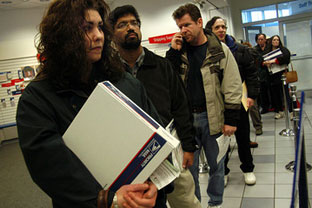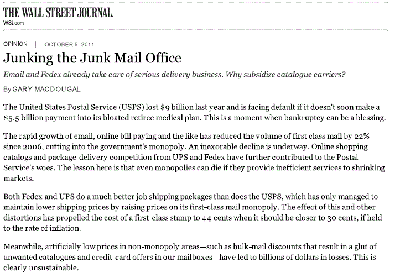Email and Fedex already take care of serious delivery business. Why subsidize catalogue carriers?
October 5, 2011
By
Gary MacDougal
 The United States Postal Service (USPS) lost $9 billion last year and is facing default if it doesn't soon make a $5.5 billion payment into its bloated retiree medical plan. This is a moment when bankruptcy can be a blessing.
The United States Postal Service (USPS) lost $9 billion last year and is facing default if it doesn't soon make a $5.5 billion payment into its bloated retiree medical plan. This is a moment when bankruptcy can be a blessing.
The rapid growth of email, online bill paying and the like has reduced the volume of first class mail by 22% since 2006, cutting into the government's monopoly. An inexorable decline is underway. Online shopping catalogs and package-delivery competition from UPS and Fedex have further contributed to the Postal Service's woes. The lesson here is that even monopolies can die if they provide inefficient services to shrinking markets.
Both Fedex and UPS do a much better job shipping packages than does the USPS, which has only managed to maintain lower shipping prices by raising prices on its first-class mail monopoly. The effect of this and other distortions has propelled the cost of a first-class stamp to 44 cents when it should be closer to 30 cents, if held to the rate of inflation.
Meanwhile, artificially low prices in non-monopoly areas—such as bulk-mail discounts that result in a glut of unwanted catalogues and credit-card offers in our mailboxes—have led to billions of dollars in losses. This is clearly unsustainable.
In addition to rejecting a bailout and permitting bankruptcy, our political leaders should end the USPS's dysfunctional first-class mail monopoly, opening it up to private competition. This would pave the way for the tough restructuring decisions that need to be made by USPS management, the American Postal Workers Union, advertisers and other stakeholders. Putting a $5 billion Band-Aid on this fundamentally uneconomic business would only postpone the inevitable and waste more taxpayer dollars.

As for the 559,000 USPS employees, a thoughtful triage approach can sort out those senior employees who can be encouraged to take early retirement, junior employees who can receive normal severance, and those in the middle who deserve whatever special arrangements can be provided using proceeds from the sale of assets. Post offices usually occupy prime real estate in cities and towns across America, potentially of great interest to retailers, restaurateurs, municipal governments and others. The more than 200,000 USPS vehicles are also saleable.
With no stockholders to worry about, these assets can fund a thoughtful and responsible wind-down. Postal Service employees are generally very well paid and (with some notable exceptions, usually in smaller towns) have rarely been characterized by high productivity. Visits to the post office are not normally known to be user-friendly experiences. It is a good bet that the private sector will be considerably more productive—and user-friendly—than today's government employees, no matter how loyal they may be.
With a well-managed Postal Service wind-down, Fedex, UPS and others could easily and efficiently pick up much of the volume. Some could also be handled by a host of local delivery companies now serving most major cities. Farmers have long been connected to the Internet, and many already pick up their mail from a central location in town. UPS has long delivered to the most remote locations—even a rancher in New Mexico with a six-mile driveway. Fedex, UPS, DHL, cargo airlines and others can handle long-distance and international shipments. Entrepreneurs will see the demise of the USPS as an opportunity, and new companies will emerge. Indeed, this transition can be one of the badly needed bright spots in a troubled American economy.
We've all been reminded once again with the Solyndra solar-energy fiasco that, over time, market economics trump government subsidies. Solyndra's $535 million in government loan guarantees only contributed to the bad decision-making that resulted in its bankruptcy last month.
The Postal Service crisis offers the political class in Washington a chance to show that there were lessons learned from the panicked bailouts of the recent past, and that they're now beginning to pay attention to how they use the hard-earned dollars taken from American taxpayers.
The famed Austrian-American economist Joseph Schumpeter often talked of "creative destruction" as essential to the continued dynamism and growth of free markets. We loved the horse and buggy, but the car did the job better, and subsidizing the buggy makers would have been a bottomless pit. The White House and Congress should not stand in the way of a USPS bankruptcy.
Mr. MacDougal is a former partner of McKinsey & Co., the former CEO of Mark Controls Corp., and a former director of UPS from 1973 to 2007.